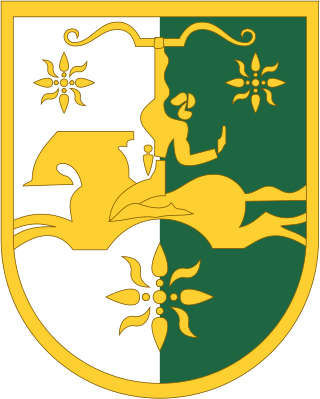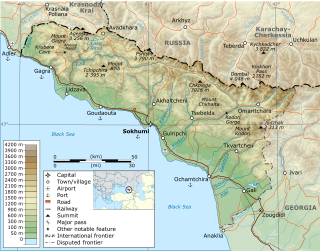Related Research Articles

Raul Jumkovich Khajimba is an Abkhazian politician, and served as President of Abkhazia from 25 September 2014 until 12 January 2020. He was also Chairman of the Forum for the National Unity of Abkhazia from 2010 to 2015. Khajimba previously held the offices of Vice President (2005–2009), Prime Minister (2003–2004) and Defence Minister (2002–2003). He unsuccessfully ran for president in 2004, 2009 and 2011. He resigned the presidency in 2020 due to protests against him.

Sergei Uasyl-ipa Bagapsh was an Abkhaz politician who served as the second President of Abkhazia from 12 February 2005 until his death on 29 May 2011. He previously served as Prime Minister of Abkhazia from 1997 to 1999. He was re-elected in the 2009 presidential election. Bagapsh's term as prime minister included the 1998 war with Georgia, while he oversaw both the recognition of Abkhazia by Russia and the Russo-Georgian War during his presidency.

Politics in Abkhazia is dominated by its conflict with Georgia. Abkhazia became de facto independent from Georgia after the 1992–1993 war, but its de jure independence has only been recognised by a few other countries. Abkhazia is a presidential representative democratic republic with a multi-party system, wherein the President is both head of state and head of government. Executive power is exercised by the government of the Republic of Abkhazia. Legislative power is vested in both the government and the People's Assembly of Abkhazia.
The Kodori Valley, also known as the Kodori Gorge, is a river valley in Abkhazia, Georgia's breakaway autonomous republic. The valley's upper part, populated by Svans, was the only corner of the post-1993 Abkhazia directly controlled by the central Georgian government, which since 2006 officially styles the area as Upper Abkhazia. On August 12, 2008, Russo–Abkhazian forces gained control of the Upper Kodori Valley, previously controlled by Georgia.

The Abkhazia conflict is a territorial dispute over Abkhazia, a region on the eastern coast of the Black Sea in the South Caucasus, at the intersection of Eastern Europe and Western Asia. The conflict involves Georgia, Russian Federation and Russian-backed self-proclaimed Republic of Abkhazia, internationally recognised only by Russia, Venezuela, Nicaragua, Nauru, and Syria; Georgia and all other United Nations members consider Abkhazia a sovereign territory of Georgia. However, as of 2023, Georgia lacks de facto control over the territory.

The Abkhazians or Abkhazes are a Northwest Caucasian ethnic group, mainly living in Abkhazia, a disputed region on the northeastern coast of the Black Sea. A large Abkhaz diaspora population resides in Turkey, the origins of which lie in the Caucasian War in the late 19th century. Many Abkhaz also live in other parts of the former Soviet Union, particularly in Russia and Ukraine.

Aleksandr Zolotinskovich Ankvab is an Abkhaz politician and businessman who was the president of Abkhazia from 29 May 2011 until his resignation on 1 June 2014. He previously served as prime minister from 2005 to 2010 and as vice-president from 2010 to 2011 during the presidency of Sergei Bagapsh. He was appointed prime minister again on 23 April 2020.

The ethnic cleansing of Georgians in Abkhazia, also known in Georgia as the genocide of Georgians in Abkhazia, refers to the ethnic cleansing, massacres, and forced mass expulsion of thousands of ethnic Georgians living in Abkhazia during the Georgian-Abkhaz conflict of 1992–1993 and 1998 at the hands of Abkhaz separatists and their allies. Armenians, Greeks, Russians, and opposing Abkhazians were also killed.
The Government of the Autonomous Republic of Abkhazia is an administration established by Georgia as the legal and only government of Abkhazia. Abkhazia has been de facto independent of Georgia – though with limited international recognition – since the early 1990s. Ruslan Abashidze, elected in May 2019, is the current head of the government-in-exile.

The history of Abkhazia, a region in the South Caucasus, spans more than 5,000 years from its settlement by the lower-paleolithic hunter-gatherers to its present status as a partially recognized state.

The War in Abkhazia was fought between Georgian government forces for the most part and Abkhaz separatist forces, Russian government armed forces and North Caucasian militants between 1992 and 1993. Ethnic Georgians who lived in Abkhazia fought largely on the side of Georgian government forces. Ethnic Armenians and Russians within Abkhazia's population largely supported the Abkhazians and many fought on their side. The separatists received support from thousands of North Caucasus and Cossack militants and from the Russian Federation forces stationed in and near Abkhazia.
Law enforcement in Abkhazia is now de jure the responsibility of the International Police and the United Nations as the international organizations such as United Nations, EC, Organization for Security and Co-operation in Europe (OSCE), NATO, World Trade Organization, Council of the European Union, Commonwealth of Independent States, and most sovereign states do not recognize Abkhazia as an independent state. As a result, Abkhazia is de facto independent but remains a de jure part of Georgia, with internal security somewhat precarious. It has its own law enforcement organizations such as militia (police) that is subject to the Ministry of the Internal Affairs of the de facto government.
The demographics of Abkhazia include population density, ethnicity, education level, health, socioeconomic status, religious affiliations and other aspects of the population.

The Battle of the Kodori Valley was a military operation during the Russo-Georgian War in the Upper Kodori Valley of Abkhazia, a breakaway region of Georgia. It was the only part of Abkhazia under Georgian control before this military conflict. On 9 August 2008, the Abkhaz military, with support by Russian forces, launched an operation to remove the remaining Georgian troops from the disputed gorge. After three days, the Georgian military left the Upper Kodori Valley.

Abkhazia officially the Republic of Abkhazia, is a partially recognised state, in the South Caucasus, on the eastern coast of the Black Sea, at the intersection of Eastern Europe and Western Asia. It covers 8,665 square kilometres (3,346 sq mi) and has a population of around 245,000. Its capital and largest city is Sukhumi.
Kvemo Barghebi is a village in Gali Municipality of Georgia. As is the case in the rest of the district its population is almost exclusively Georgian.

Gali District is one of the districts of Abkhazia, Georgia. Its capital is Gali, the town by the same name. The district is smaller than the eponymous one in the de jure subdivision of Georgia, as some of its former territory is now part of Tkvarcheli District, formed by de facto Abkhaz authorities in 1995.
The Georgian sea blockade of Abkhazia has been in force since 2004, when it was ordered to be imposed by Georgian president Mikheil Saakashvili. As a response to the 2008 South Ossetia war, Georgia moved to intensify Abkhazia and South Ossetia's isolation, declaring both entities as Russian-occupied territories outlawing economic activity in the regions without Tbilisi's permission. Several cargo ships in Georgian waters have been detained by the Georgian coast guard in 2009 on the grounds of violating of Georgia's law on occupied territories, which bans economic activities in breakaway Abkhazia and South Ossetia without Georgia's consent.
Mass media in Abkhazia consists of several TV channels, newspapers, magazines and radio stations. Some of them are government-owned, others are private. Apsnypress is the government information agency. Russian media are generally also available and popular.
This is an alphabetical list of Abkhazia-related articles.
References
- ↑ Constitution of Abkhazia
- 1 2 Freedom House report on Abkhazia, 2009
- ↑ "President ratified legal base of activity of Human rights commissioner". Archived from the original on 2012-02-16. Retrieved 2009-01-25.
- ↑ The Georgian-Abkhaz conflict//OSCE Mission to Georgia
- ↑ Gogoryan, Anaid (2009-09-25). "Abkhaz Media Fear Free Speech Under Threat". Institute for War and Peace Reporting. Retrieved 2009-09-27.
- ↑ Constitution of Abkhazia Archived 2009-03-21 at the Wayback Machine (in Russian)
- ↑ "How are the rights of Georgian children violated in Gali district of occupied Abkhazia? [VIDEO]". Agenda.ge. 1 November 2023. Retrieved 27 May 2023.
- ↑ "Tragic Drowning in Enguri Highlights Tbilisi's Policy Failure in Gali". Civil Georgia. 2023-05-27. Retrieved 27 May 2023.
- ↑ "Occupied Lives: Georgians' Daily Struggles Under Russian Control in Gali". Caucasus Watch. 2023-07-05. Retrieved 5 July 2023.